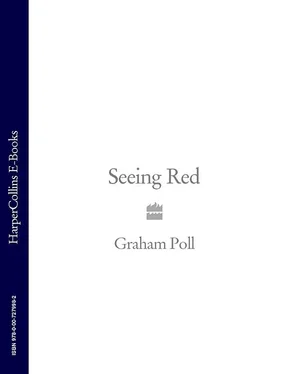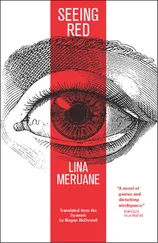An ITV crew was lying in wait as I got to the ground and a camera was trained on me for every step of my walk from the car to the dressing room. Robbie Earle asked for ‘just one comment on the record’ but I said ‘No’ again. Later I ambled out into the middle for the pitch inspection, faking total confidence. The camera followed me again.
In the press box, at the modest occasion of a Football League game, were some big-name, big-hitting newspaper writers: the columnists and opinion-formers. Most of them had formed their own opinion about me years before. They thought I hogged the limelight. But I really did not want any publicity from them, particularly on that day.
When I went out to warm-up I braced myself. At best, I expected merciless mickey-taking from spectators. At worst, I feared scorn and derision. What I received was applause and some encouraging remarks from spectators. I have never been more delighted about the English trait of rallying round someone who has suffered. As the local football paper, The Green Un , remarked, ‘Rarely has a referee been so popular.’
Of course there was banter. In one area of one stand, a group of supporters had pieces of yellow card with the number three written on them by the same pen and in the same handwriting. Someone had gone to a lot of trouble. Perhaps it was a coincidence that an ITV camera was stationed in that part of the ground. Perhaps.
The game kicked off. Eventually and inevitably I had to take a player’s name. Out came my yellow card and I heard the chant that was to provide backing music for my season: ‘ Two more … he only needs two more .’
That time the joke brought a genuine smile to my face and I thought, ‘You can cope with this, Pollie.’
So I was up and running. Now what I hoped for was six months of … nothing. No headlines and no controversy. I wanted the only reference to me to be the one at the bottom of reports, under the teams, where it said, ‘Referee: G. Poll (Herts)’.
A week after the Colchester game, the Premiership season kicked off and I took charge of Arsenal’s first match at the stunning new Emirates Stadium, against Aston Villa. It passed without incident and I was less of a story for the media than I had been the week before.
Fulham’s match against Sheffield United at Craven Cottage was my 300th Premier League fixture, and the next time the Select Group of referees gathered together, there was a little presentation to mark what was a significant milestone. However, in my frail state of mind, I took it as a sign that my race was almost run. I knew I would not reach 400. I wasn’t even sure of reaching 350. So instead of celebrating passing the 300 mark, I just thought, ‘That is your last milestone, Pollie.’
The matches kept coming and I was successfully avoiding headlines. I refereed the Merseyside derby at Goodison, which Everton won 3–0. I took charge when Arsenal won 1–0 at Old Trafford. I was back at Old Trafford when Manchester United beat Liverpool 2–0. They all went well; high-profile matches with a low-profile Pollie. Excellent.
I had a European Champions League match involving Real Madrid. Beckham made a point of coming to see me in my dressing room and, again, wishing me well. More encouragement. More positive thoughts.
I took charge of Chelsea’s home game against Aston Villa and should have sent off Chelsea’s Claude Makelele just before the end. But the referee’s assessor did not dock me any points for it. All was going swimmingly.
I was scheduled to referee Tottenham versus Chelsea. It was a Sunday afternoon game, which would be televised live, on 5 November. Inevitably, Sky TV’s pre-publicity asked, ‘Will there be fireworks on Bonfire Day?’ They obviously hoped the answer would be ‘Yes’. I was desperate for a ‘No’. Sky got their wish.
CHAPTER THREE
At the start of every season, referees note the fixtures they consider ‘golden games’ – the top matches. In the Premier League they are the fixtures between the top four clubs and the derby games with the fiercest rivalries. Tottenham against Chelsea was not quite up there in that top rank, but it was certainly near the top of the next tier. For me, games at Tottenham’s White Hart Lane were enjoyable for two reasons. Firstly, they were easy for me geographically – the hotel in which officials gather before the match is a shortish drive from my home – and the second reason I enjoyed games at White Hart Lane was that the club looked after officials and their guests particularly hospitably.
The problem is that referees’ guests are seated two rows from the front, in a section next to some of the noisiest, most partisan away supporters. So, although nothing in the buildup led me to think that the game would be in any way out of the ordinary, on that 5 November my wife and children heard a few choice adjectives about me.
Chelsea scored first, after fifteen minutes. Spurs failed to clear a corner and Claude Makelele spanked in a twenty-five-yard, swerving volley. A few moments later, I spotted John Terry pushing and shoving as the ball came over for a corner and so I awarded a free-kick to Spurs. It was a perfectly straightforward decision but, after I had whistled, Didier Drogba headed the ball into the Spurs net. Spurs goalkeeper Paul Robinson had heard my whistle, and made no real attempt to stop the header, but Chelsea supporters thought, briefly, that their team had doubled their lead.
Instead, Tottenham equalized after twenty-four minutes. Jermaine Jenas took a free-kick and Michael Dawson, Tottenham’s six foot two inch defender, scored with a glancing header.
The first refereeing flashpoint was at what should have been a routine free-kick, moments before half-time. It was away on Tottenham’s right wing and should not have perturbed Chelsea at all, yet Makelele and Ashley Cole would not go back ten yards. When Makelele retreated, Cole edged forward, and vice versa. They both knew I was not going to let them get away with that, so perhaps their pantomime was designed to take the mickey and undermine my authority.
I paced out the distance and called out, ‘Claude, Coley … back you come … just here … please.’
They stayed put. Cole told me to ‘F*** off’.
I did not send him off for that. I know that those who disapprove of all swearing during a match will contend that I should have done; but I did caution both Makelele and Cole. I had done all I could to get them to retreat sensibly.
Aaron Lennon put Spurs ahead seven minutes into the second half. He controlled Robbie Keane’s deflected centre and then placed his careful shot out of the reach of Hilario. After sixty-three minutes, I cautioned Terry when he felled Dimitar Berbatov in full flow. Terry’s was the sixth name in my book and had no particular significance to either of us at that moment.
But as my watch ticked off the minutes, Chelsea, whose discipline had been poor all game, began to look spooked by the possibility of defeat. The Press Association reporter at the game wrote, ‘Chelsea had been clearly rattled by Tottenham’s fightback.’
Michael Ballack gave me some verbals, and when I cautioned him for dissent, a group of Chelsea players surrounded me. I restored order and dispersed the posse of players but felt it had been a concerted attempt to intimidate me. It was probably instinctive and not deliberate, but I made a mental note that I would have to report it.
Then, at a corner, Terry grappled with Tottenham defender Ledley King. He grabbed King’s arm and dragged him to the ground. I realized that I would have to send Terry off if I cautioned him again, but my honest, instinctive opinion was that the incident deserved a booking. If it had been a player who had not been cautioned already, it would not have been an issue, and so fairness required that I took his name, again.
Читать дальше












